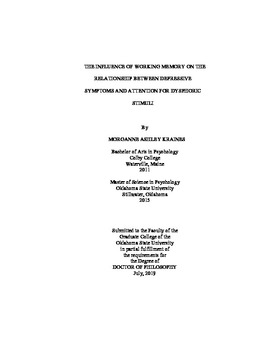| dc.contributor.advisor | Wells, Tony T. | |
| dc.contributor.author | Kraines, Morganne Ashley | |
| dc.date.accessioned | 2020-01-30T15:03:07Z | |
| dc.date.available | 2020-01-30T15:03:07Z | |
| dc.date.issued | 2019-07 | |
| dc.identifier.uri | https://hdl.handle.net/11244/323353 | |
| dc.description.abstract | Cognitive models suggest that depressed individuals display biased attention for depression-relevant information. One factor that contributes to our ability to attend to information is working memory. Research suggests that depressed individuals show deficits in working memory. This study experimentally examined the role of working memory on the relationship between depressive symptoms and attention for dysphoric stimuli. We tested four hypotheses: 1) increased depression would be associated with increased attention for dysphoric emotional stimuli; 2) increased depression symptoms would be associated with deficits to phonological and visuospatial working memory; 3) there would be an indirect effect of working memory on the relationship between depression symptoms and attention for dysphoric stimuli; and 4) a working memory load would moderate the relationship between depression symptoms and attention for dysphoric stimuli such that under a load condition, the relationship between depressive symptoms and attention for dysphoric stimuli would be stronger than in a no load condition. One hundred forty-seven participants completed measures of depressive symptoms, social anxiety symptoms, phonological and visuospatial working memory tasks, and two runs of an eye tracking task measuring attention bias to emotional facial expressions. During one of the eye tracking runs, participants completed The Serial Three's Task as a working memory load. Results supported our first hypothesis, that increased symptoms of depression were associated with increased attention to dysphoric stimuli, but our remaining hypotheses were unsupported. Possible explanations for our results include using non-emotionally valenced working memory tasks and The Serial Three's Task being too difficult. Nonetheless, results contribute to the growing literature examining cognitive factors and depression. Future work could examine differing levels of working memory loads, or use a working memory load that is emotionally valenced. | |
| dc.format | application/pdf | |
| dc.language | en_US | |
| dc.rights | Copyright is held by the author who has granted the Oklahoma State University Library the non-exclusive right to share this material in its institutional repository. Contact Digital Library Services at lib-dls@okstate.edu or 405-744-9161 for the permission policy on the use, reproduction or distribution of this material. | |
| dc.title | Influence of Working Memory on the Relationship Between Depressive Symptoms and Attention for Dysphoric Stimuli | |
| dc.contributor.committeeMember | Grant, DeMond M. | |
| dc.contributor.committeeMember | Alderson, R. Matthew | |
| dc.contributor.committeeMember | Crick, Christopher J. | |
| osu.filename | Kraines_okstate_0664D_16118.pdf | |
| osu.accesstype | Open Access | |
| dc.type.genre | Dissertation | |
| dc.type.material | Text | |
| thesis.degree.discipline | Psychology | |
| thesis.degree.grantor | Oklahoma State University | |
